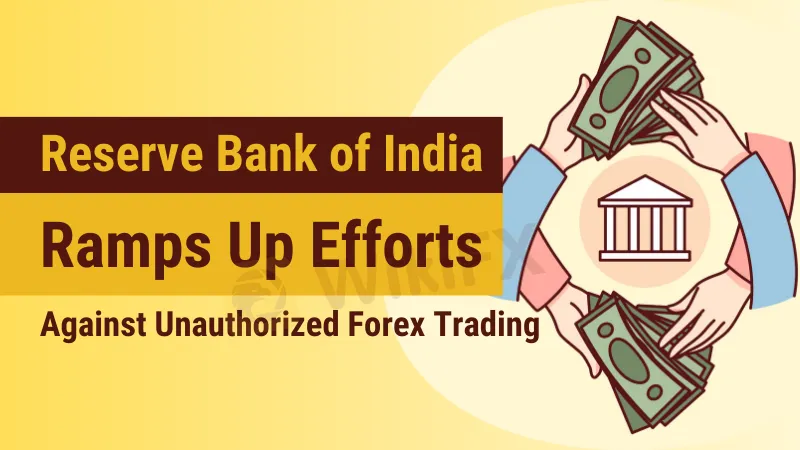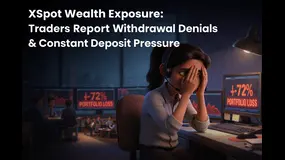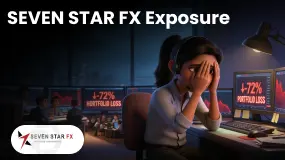WikiFX Spring Festival Message | Grounded in Transparency, Walking with Trust
As the Lunar New Year approaches, renewal is in the air. It is a moment to bid farewell to the old, welcome the new, and reflect while moving forward.
简体中文
繁體中文
English
Pусский
日本語
ภาษาไทย
Tiếng Việt
Bahasa Indonesia
Español
हिन्दी
Filippiiniläinen
Français
Deutsch
Português
Türkçe
한국어
العربية
Abstract:RBI takes strict action against illegal forex trading, enhancing KYC norms and using technology for financial stability.

With the explicit intention of safeguarding India's financial stability, the Reserve Bank of India (RBI) has declared a succession of stringent protocols designed to suppress illicit foreign exchange trading. The Economic Times has documented a worrisome increase in unauthorized foreign exchange transactions, which has prompted the development of this strategic initiative.
The RBI is actively engaged in dialogues with a number of banks and government entities in an effort to devise and execute stringent measures that would efficiently deter the unauthorized use of banking channels for foreign exchange transactions. In light of the recent arrests associated with these unlawful activities, this decision underscores the central bank's dedication to preserving the credibility of India's financial systems.
Two merchants were apprehended by the Directorate of Enforcement earlier this year on suspicion of engaging in illicit foreign exchange trading. The individuals, situated in Kolkata, possessed an extraordinary 180 bank accounts, which resulted in the confiscation of Rs 120 crore. The proactive approach of the RBI is additionally demonstrated through the compilation of an alert list that includes seventy-five entities, such as unauthorized platforms and websites involved in illicit foreign exchange transactions.
In an endeavor to enhance its regulatory framework, the Reserve Bank of India (RBI) has addressed a letter to stakeholders soliciting recommendations on how to combat illicit foreign exchange trading. In all foreign exchange (FX) transactions, the central bank stresses the critical significance of increased public awareness and stricter adherence to Know Your Customer (KYC) regulations.

There have been proposals from bank administrators in both the public and private sectors to integrate supplementary technological controls. The objective of these recommendations is to augment the surveillance and supervision of foreign exchange transactions. The Joint Venture of the Reserve Bank of India (RBI) and the Ministry of Electronics and Information Technology (MeitY) aims to leverage technological progress in order to enhance the detection and prevention of illicit foreign exchange operations.
Multiple advisories have been issued by the RBI, advising against conducting business with unauthorized platforms and entities and citing potential legal repercussions under the Foreign Exchange Management Act of 1999 (FEMA). Concurrently, the RBI is promoting the implementation of all-encompassing public education initiatives aimed at enlightening the populace regarding the hazards linked to unlicensed electronic trading platforms (ETPs).
The Reserve Bank of India (RBI) has issued advisories in which it specifically names Alpari, AnyFX, Ava Trade, Binomo, eToro, Exness, Expert Option, FBS, FinFxPro, Forex.com, Forex4money, and Foxroex, urging the general public to exercise caution and diligence.
The Reserve Bank of India, which was founded in 1935, serves as India's highest monetary authority. The Reserve Bank of India (RBI), which is responsible for overseeing the nation's financial sector, is instrumental in developing and executing monetary policy. Furthermore, it exercises authority over the issuance of currency and administers the nation's foreign exchange reserves, thereby promoting growth and economic stability.

Disclaimer:
The views in this article only represent the author's personal views, and do not constitute investment advice on this platform. This platform does not guarantee the accuracy, completeness and timeliness of the information in the article, and will not be liable for any loss caused by the use of or reliance on the information in the article.

As the Lunar New Year approaches, renewal is in the air. It is a moment to bid farewell to the old, welcome the new, and reflect while moving forward.

XSpot Wealth has found many negative comments from traders who have allegedly been deceived by the broker. Traders constantly accuse the broker of causing unnecessary withdrawal blocks and forcing them to continue depositing with it. Many user complaints emerged on WikiFX, a leading global forex regulation inquiry app. In this XSpot Wealth review article, we have investigated multiple complaints against the broker. Read on!

Did SEVEN STAR FX make unreasonable verification requests and block your forex trading account later? Did the broker prevent you from accessing fund withdrawals? Were you made to wait for a long time to receive a response from the broker’s customer support official? Have you had to seek legal assistance to recover your stuck funds? Well, these are some claims made by SEVEN STAR FX’s traders. In this SEVEN STAR FX review article, we have looked closely at the company’s operation, the list of complaints, and a take on its regulatory status. Keep reading to know the same.

When traders search for "Is ZarVista Safe or Scam," they want to know if their capital will be safe. Nice features and bonuses do not matter much if you can't trust the broker. This article skips the marketing talk and looks at real evidence about ZarVista's reputation. We want to examine actual user reviews, look into the many ZarVista Complaints, and check the broker's legal status to get a clear picture. The evidence we found shows serious warning signs and a pattern of major user problems, especially about the safety and access to funds. This report gives you the information you need to make a smart decision about this risky broker.
